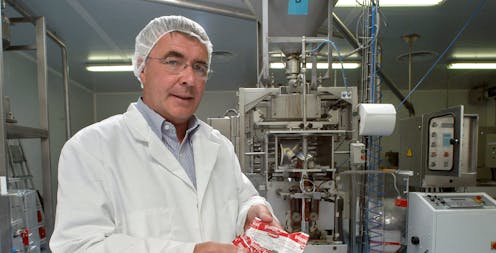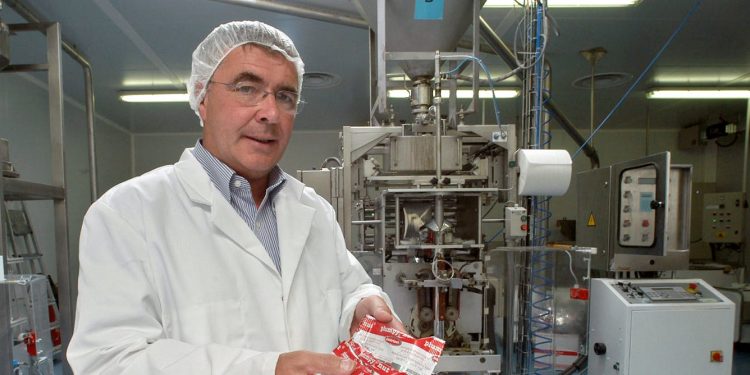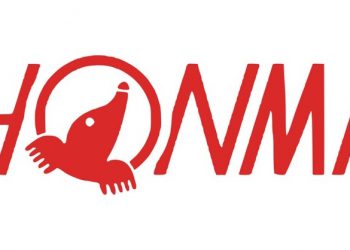
About 19 million children under 5 around the world suffer from severe acute malnutrition every year. This life-threatening condition kills 400,000 of them – that’s one child every 10 seconds.
These numbers are staggering, especially because a lifesaving treatment has existed for nearly three decades: “ready-to-use therapeutic food.”
Nutriset, a French company, was founded by Michel Lescanne. He was one of two scientists who invented this product in 1996. A sticky peanut butter paste branded Plumpy’nut, it’s enriched with vitamins and minerals and comes in packets that require no refrigeration or preparation.
Health care professionals were quickly convinced of its promise. What was harder to figure out was how to manufacture as many packets as possible while cutting costs. In 2008, ready-to-use therapeutic food producers like Nutriset charged US$60 for one box of 150 packets – the number needed to treat one severely malnourished child for the 6-8 weeks needed for their recovery.
In a study we published in the Journal of Management Studies in October 2024, we explained how the international agencies, nongovernmental organizations, activists and for-profit companies involved in the product’s distribution managed to resolve a public controversy over the use of Nutriset’s patent and its for-profit business model.
Contrary to the expectations of activists and many humanitarian NGOs, this for-profit company managed to reduce its prices down to $39 per box of Plumpy’nut packets by 2019 and keep them consistently lower than any nonprofit or for-profit competitors could, all the while enforcing its patent rights.
We interviewed Jan Komrska, a pharmacist then serving as the ready-to-use therapeutic food procurement manager at UNICEF, the United Nations agency for children; Tiddo von Schoen-Angerer, a pediatrician who was leading the access to medicines campaign at Doctors Without Borders, a medical charity; and Thomas Couaillet, a Nutriset executive. We also studied documents issued over the course of a decade to find out why this company’s unusual approach to intellectual property protection was so successful.
Helping franchisees in low-income countries get started
Nutriset and humanitarian organizations disagreed at the start over how to proceed with the production of ready-to-use therapeutic food.
Doctors Without Borders at first accused Nutriset of behaving like a big drugmaker, shielding itself from competition by aggressively enforcing its patents to charge excessively high prices. The nongovernmental organization demanded that Nutriset allow any manufacturer to make its patented packets, without any compensation for that intellectual property.
By 2012, Nutriset had changed course. It had stopped being almost the sole producer of ready-to-use therapeutic food and instead allowed licensees and franchisee partners, chiefly located in low-income countries, to make the packets without having to pay any royalties. It did, however, make an exception for the United States. It allowed Edesia, a Rhode Island-based nonprofit, to become a Nutriset franchisee.
It also provided these smaller producers with seed funding and technical advice.
Nutriset is still the world’s largest ready-to-use therapeutic food producer, we have determined through our research. It’s responsible for about 30% to 40% of the world’s annual production, down from more than 90% in 2008.
There are some other U.S. manufacturers, such as Tabatchnick Fine Foods, but they aren’t Nutriset partners.
Threatening legal action
At the same time, the company continued to threaten to take legal action against potential rivals located in developed countries that were replicating their recipe without authorization. Usually, cease-and-desist letters were sufficient.
Nutriset implemented this strategy to ward off competition from big multinational corporations that might try to establish their brands in new markets, gaining a foothold before flooding them with imported ultraprocessed food. A big risk, had that occurred, would have been less breastfeeding for newborns and the disruption of local diets.
Nutriset’s strategy of opening access to its patent selectively has enabled UNICEF to double the share of packets it buys from producers located in the Global South.
UNICEF, the world’s biggest buyer of ready-to-use therapeutic food, bought less than one-third of its supplies from those nations in 2011. That share climbed to two-thirds in 2022.
Nutriset’s reliance on local franchisees has helped create over 1,000 jobs in hunger-stricken regions while strengthening the supply chain and reducing the carbon emissions of transportation, according to UNICEF.
Nutriset’s creative patent strategy also helped its partner producers in low-income countries, which include nonprofit and for-profit ventures, compete with large corporations in developed countries by the time its patent expired in 2018.
In this instance, a for-profit company not only managed to keep its prices lower than its competitors, including nonprofits, but used its patent to support economic development in developing countries by shielding startup producers from international competition.
As a result of these successes, we found that nongovernmental organizations eventually stopped criticizing the French company and recognized that high prices were actually not due to Nutriset’s patent policy but rather to global prices of the packets’ ingredients.
In recognition of its contributions and innovation, Nutriset won the U.S. Patent and Trademark Office’s Patents for Humanity Award in 2015.
Offering a cheap, convenient and effective treatment
One of the biggest advantages of ready-to-use therapeutic food is that parents or other caregivers can give it to their kids at home or on the go. That’s more convenient and cheaper than the alternative: several months of hospitalization where children receive a nutrient-dense liquid called “therapeutic milk.”
The at-home treatment works most of the time. More than 80% of the children who get three daily food packets recover within two months.
Severe acute malnutrition deaths remain high because historically only 25% to 50% of children suffering from it get treated with ready-to-use therapeutic food, due to insufficient funding. The treatment programs are run by governments, UNICEF and other international agencies, and NGOs such as Doctors Without Borders.
USAID’s funding role
The U.S. government spent about $200 million in 2024 through the U.S. Agency for International Development on ready-to-use therapeutic food, enough packets to treat 3.9 million children. That’s nearly as much as UNICEF, which treats about 5 million children annually.
It’s unclear whether the Trump administration, which is trying to dismantle USAID, will discontinue its funding of ready-to-use therapeutic food that the U.S. government has purchased exclusively from U.S. manufacturers with U.S.-sourced ingredients.
At a time when the flow of development aid from several wealthy countries is declining, the precedent Nutriset set suggests that humanitarian organizations, by teaming up with international agencies, governments and for-profit companies, can help drive down the costs of saving lives threatened by hunger while increasing the nutritional autonomy of the Global South.
But the funding for ready-to-use therapeutic food and its distribution has to come from somewhere, whether it is from governments, foundations or other donors.
![]()
The authors do not work for, consult, own shares in or receive funding from any company or organization that would benefit from this article, and have disclosed no relevant affiliations beyond their academic appointment.













